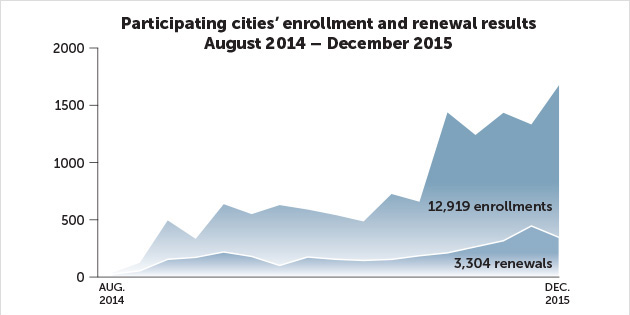More than 16,000 uninsured children and parents nationwide enrolled in or renewed health insurance through the Cities Expanding Health Access for Children and Families initiative. The program helped protect and improve public health by using enrollment campaigns targeted at families who were eligible for but not enrolled in Medicaid or the Children’s Health Insurance Program (CHIP).
Launched in January 2013, the $3.25 million competitive grant program had three phases. In the first phase, representatives from 23 cities participated in leadership academies to learn about effective health insurance outreach and enrollment strategies. In the second phase, 12 selected cities developed business plans for reaching and enrolling residents who were eligible for but who were not participating in public health insurance. In the third and final phase, 8 cities were awarded grants to implement their plans.
The initiative was sponsored by the Atlantic Philanthropies, administered by the National League of Cities, and evaluated by Mathematica Policy Research. The cities that were awarded the implementation grants were (1) Dallas, Texas; (2) Garden City, Michigan; (3) Hattiesburg, Mississippi; (4) Jacksonville, Florida; (5) New Bedford, Massachusetts; (6) Pittsburgh, Pennsylvania; (7) Providence, Rhode Island; and (8) Savannah, Georgia. Each city implemented a robust campaign that included a combination of community, public school, and media outreach. Through the initiative, participating cities supported nearly 13,000 new enrollments and more than 3,000 renewals between August 2014 and December 2015.
Mathematica evaluated the initiative to determine how effective municipal governments can be at increasing Medicaid and CHIP enrollment and to understand the factors that contribute to success. The evaluation also identified the risks and rewards of grant-making strategies that follow a three-stage model of support and competition. In a final report to be released this summer, Mathematica will synthesize lessons learned, promising practices, and common barriers so that cities across the nation will be able to develop and implement their own strategies for increasing the enrollment of children and families who are eligible for public health insurance.
More information about the initiative can be found in our online fact sheet and video, which features local officials and community partners describing their experiences.

